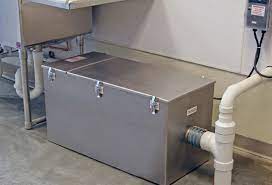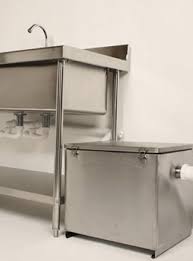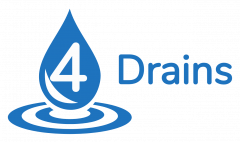
Do you need to put in place Grease management ?
Grease management is a very important thing to consider when looking after your drains.
Not only is it required by law to safely dispose of grease waste from a business premises.
We also have a responsibility to the environment to make sure it is protected from grease waste...
The law Regarding grease management in the UK.
It is a legal requirement for any UK business producing or selling hot food. That they are required to install and maintain a suitable grease trap for the properties drainage use and make all reasonable efforts to stop (FOG) Fats, Oils or Grease entering the public sewer system.
Section 111 of the water industry act of 1991 states that pubs, restaurants, and takeaway premises found to be discharging oils, fats and greases into the sewer causing a compromise to the free flow of wastewater can be prosecuted. Prosecution can result in a substantial fine.
Grease traps.
Grease traps by design are a special box or holding pit usually with baffled sections to separate F.O.G from your discharged waste water. Preventing blocked drains and solidified fatty deposits known as fatbergs.
Depending on size and type, the grease trap should be either emptied and cleaned by a professional at regular intervals. Or swapped out like for like and taken away for service and cleaning.
The size of grease trap required would be determine by the amount of waste produced from each premises. This is advised to be assessed by a drain / grease company.

Things to do to prevent Grease Build up in your drains.
Blocked drains caused by grease build up cause massive disruption to your business. Especially if your business is reliant on the use of a kitchen or food production area.
The deposits of F.O.G stick to the inside diameter of the drain pipe and as they build up the pipe is slowly constricted until waste water will no longer pass. Alike to the analogy of a heart attack victim, where by the arteries clog up and eventually stop the flow of blood.
The key to preventing this is by maintenance of the drains and grease management. By using the following.
- Using plug strainers. This will stop food parts and general unwanted solids from accumulating in your drain pipes.
- Try to use environmentally safe cleaning products such as enzyme sticks. These are placed once a month into the plug hole of a kitchen sink and as water passes them they break down and attack grease and grime whilst combating odours and preventing a blocked sink.
- Drain dosing is a method used in commercial kitchens where an automated system puts a measured amount of enzyme or drain cleaning product into the wastepipes at the end of service.
- Remove and clear out any accessible traps which are designed to hold any solids washed away by mistake.
- Allow waste grease / fats to cool to room temperature when cooking. Then collect and dispose of responsibly. Do not rinse into the sinks which will cause a blocked drain and drain smells which encourage drain rats.
- Install a suitable grease trap. This will save money and time from unwanted blockages. And keep your business compliant with the law.
- Have a drain company carry out regular checks and drain cleaning. It can be a lot cheaper to maintain a drain than it is to call on emergency drain services. Usually once a drain has had an initial clean and has been brought back up to scratch, it will continue to work flawlessly for a long time as long as there are no underlying issues and the system is being used correctly.

If our services for blocked drains, grease management, blocked sinks, drain rats, maintenance are needed and you live in the southeast of England (UK) Please contact our staff and we will be happy to help.
Thankyou for reading. Why not like and subscribe to our media and make the most of our offers, news, tips and services. 4 Drains. Or continue reading our blog.
